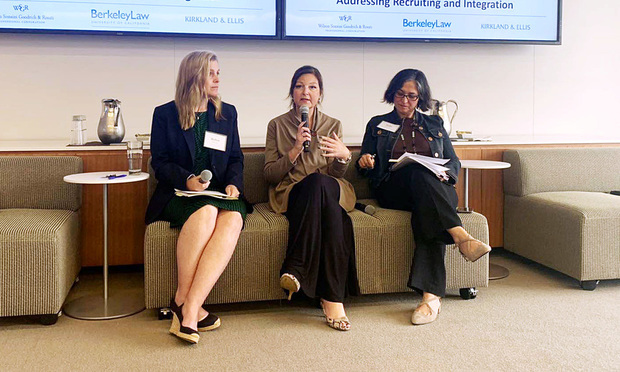Big Law Well-Being Counselors Advise Lawyers to Hold on to Identities Outside Law
“Please do not lose your identity just because you chose to become a lawyer,” said Wilson Sonsini's professional development director Serena Miller.
June 14, 2019 at 06:14 PM
5 minute read
 Robin Belleau, director of well-being with Kirkland & Ellis, Serena Miller, director of professional development with Wilson Sonsini Goodrich & Rosati, and Delia Violante, director of the Women in Business Law Initiative with Berkeley Law, during the Women in Business Law Initiative hosted by the Berkeley Center for Law and Business on Thursday.
Robin Belleau, director of well-being with Kirkland & Ellis, Serena Miller, director of professional development with Wilson Sonsini Goodrich & Rosati, and Delia Violante, director of the Women in Business Law Initiative with Berkeley Law, during the Women in Business Law Initiative hosted by the Berkeley Center for Law and Business on Thursday.
Well-being professionals from two Big Law firms had a simple message for young attorneys at a recent panel discussion: they are more than just lawyers.
At the second quarterly roundtable event of the Women in Business Law initiative, hosted by the Berkeley Center for Law and Business, professional development and wellness counselors at Wilson Sonsini Goodrich & Rosati and Kirkland & Ellis urged young lawyers not to lose their identities outside the law.
The Women in Business Law Initiative, which kicked off in 2016, aims to address gender inequity in business law. During the June 13 panel, Robin Belleau, Kirkland & Ellis's new well-being director, noted the Illinois lawyers' assistance program has been finding aging attorneys refusing to retire because “their whole identity was wrapped up being a lawyer.”
Belleau said noted the importance of non-law relationships, hobbies and interests. Though, she also acknowledged that maintaining those things can be a challenge for young lawyers whose spare time is minimal.
Wilson Sonsini professional development director Serena Miller echoed Belleau's comments: “Please do not lose your identity just because you chose to become a lawyer,” she said.
The panel event was moderated by Delia Violante, program director of the Berkeley Center for Law and Business. Since founding the program, the school has partnered with law firms to offer career development, mentorship and networking programs for students and professionals.
Citing a 2016 study by the Hazelden Betty Ford Foundation and the American Bar Association Commission on Lawyer Assistance Programs, Belleau pointed out that 28% of licensed, employed attorneys have reported struggling with some level of depression, and 19% demonstrated symptoms of anxiety. The study also found that younger attorneys in the first 10 years of practice exhibit the highest incidence of these problems.
“There's a lot of thoughts and reasons to why that might be,” Belleau said, listing several common stressors: “Coming out of law school with increased debt, trying to find jobs, just the 24/7 work environment—technology allows you to always be present, always be there.”
But she also noted a generational difference.
“The younger generation, I think, is more willing to admit 'I am experiencing stress,' 'I am experiencing anxiety and depression,' and more willing to name it and own it.”
With the numbers of associates who are seeking help largely outpacing the number of the career advisers at a law firm, Miller urged young lawyers to take ownership of their career and make viable connections that will help them.
“You are all still very, very fresh, you are very new and honest, you really don't know Jack,” Miller said. “So, we are here to help you with that, but I need you to take a little bit ownership in of that.”
The Cost of Saying No
When a law student in the audience asked whether an associate should ever say “no” to his or her superior, and what the potential costs of doing so might be, the two panelists' agreed that communication is key.
“It's going to depend. As most things in the law, there are many shades of gray,” Miller said. She advised the student to do a cost-benefit analysis on the impact on the relationship with the person making the request. If the relationship is important, the price of saying no increases dramatically, she said.
“The ultimate cost is that you erase the amount of trust that you either created or you are attempting to leverage, and that can be one of the worst possible things that can happen to your reputation as a junior associate within a firm,” she added. “So, am I going to just go out on a limb and say you probably need to suck it up and do it? Yep”
Belleau, on the other hand, suggested that communication can help mitigate the cost. She noted as young associates, there are a number of things that are beyond their control, so it's important for them to have a clear understanding of their schedule and communicate their responsibilities with the senior attorneys.
“At least put that out there, giving it a business reason … I think rational people are more likely to accept that,” Belleau said.
Miller added that “communication is single-handedly the thing that gets lost the most in the dynamic between lawyers, which is horribly ironic giving the fact that we are paid very highly by our clients to communicate, clearly, concisely and frequently.”
Read More
Netflix and Firm Lawyers Swap Advice for Recruits at Berkeley Law Event
Kirkland Hires Lawyer Turned Therapist to Lead New Wellness Effort
This content has been archived. It is available through our partners, LexisNexis® and Bloomberg Law.
To view this content, please continue to their sites.
Not a Lexis Subscriber?
Subscribe Now
Not a Bloomberg Law Subscriber?
Subscribe Now
NOT FOR REPRINT
© 2025 ALM Global, LLC, All Rights Reserved. Request academic re-use from www.copyright.com. All other uses, submit a request to [email protected]. For more information visit Asset & Logo Licensing.
You Might Like
View All
Prepare Your Entries! The California Legal Awards Have a New, February Deadline
2 minute read
California Legal Awards Moving to Mid-Summer Date in 2025, Adds New Categories
2 minute read
'You Can’t Do a First Draft of Common Sense': Microsoft GC Jon Palmer Talks AI, Litigation, and Leadership

Shareholder Activists Poised to Pounce in 2025. Is Your Board Ready?
Trending Stories
- 1Public Notices/Calendars
- 2Wednesday Newspaper
- 3Decision of the Day: Qui Tam Relators Do Not Plausibly Claim Firm Avoided Tax Obligations Through Visa Applications, Circuit Finds
- 4Judicial Ethics Opinion 24-116
- 5Big Law Firms Sheppard Mullin, Morgan Lewis and Baker Botts Add Partners in Houston
Who Got The Work
J. Brugh Lower of Gibbons has entered an appearance for industrial equipment supplier Devco Corporation in a pending trademark infringement lawsuit. The suit, accusing the defendant of selling knock-off Graco products, was filed Dec. 18 in New Jersey District Court by Rivkin Radler on behalf of Graco Inc. and Graco Minnesota. The case, assigned to U.S. District Judge Zahid N. Quraishi, is 3:24-cv-11294, Graco Inc. et al v. Devco Corporation.
Who Got The Work
Rebecca Maller-Stein and Kent A. Yalowitz of Arnold & Porter Kaye Scholer have entered their appearances for Hanaco Venture Capital and its executives, Lior Prosor and David Frankel, in a pending securities lawsuit. The action, filed on Dec. 24 in New York Southern District Court by Zell, Aron & Co. on behalf of Goldeneye Advisors, accuses the defendants of negligently and fraudulently managing the plaintiff's $1 million investment. The case, assigned to U.S. District Judge Vernon S. Broderick, is 1:24-cv-09918, Goldeneye Advisors, LLC v. Hanaco Venture Capital, Ltd. et al.
Who Got The Work
Attorneys from A&O Shearman has stepped in as defense counsel for Toronto-Dominion Bank and other defendants in a pending securities class action. The suit, filed Dec. 11 in New York Southern District Court by Bleichmar Fonti & Auld, accuses the defendants of concealing the bank's 'pervasive' deficiencies in regards to its compliance with the Bank Secrecy Act and the quality of its anti-money laundering controls. The case, assigned to U.S. District Judge Arun Subramanian, is 1:24-cv-09445, Gonzalez v. The Toronto-Dominion Bank et al.
Who Got The Work
Crown Castle International, a Pennsylvania company providing shared communications infrastructure, has turned to Luke D. Wolf of Gordon Rees Scully Mansukhani to fend off a pending breach-of-contract lawsuit. The court action, filed Nov. 25 in Michigan Eastern District Court by Hooper Hathaway PC on behalf of The Town Residences LLC, accuses Crown Castle of failing to transfer approximately $30,000 in utility payments from T-Mobile in breach of a roof-top lease and assignment agreement. The case, assigned to U.S. District Judge Susan K. Declercq, is 2:24-cv-13131, The Town Residences LLC v. T-Mobile US, Inc. et al.
Who Got The Work
Wilfred P. Coronato and Daniel M. Schwartz of McCarter & English have stepped in as defense counsel to Electrolux Home Products Inc. in a pending product liability lawsuit. The court action, filed Nov. 26 in New York Eastern District Court by Poulos Lopiccolo PC and Nagel Rice LLP on behalf of David Stern, alleges that the defendant's refrigerators’ drawers and shelving repeatedly break and fall apart within months after purchase. The case, assigned to U.S. District Judge Joan M. Azrack, is 2:24-cv-08204, Stern v. Electrolux Home Products, Inc.
Featured Firms
Law Offices of Gary Martin Hays & Associates, P.C.
(470) 294-1674
Law Offices of Mark E. Salomone
(857) 444-6468
Smith & Hassler
(713) 739-1250






